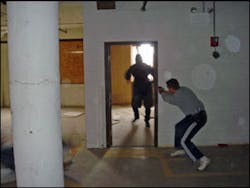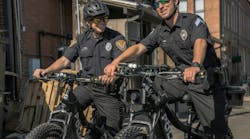If someone could give you a gift that would improve your chances of survival in a violent confrontation, would you take it? If the tradeoff was that, in order to make use of this gift, you would have to understand it and use it properly, would you take the time to do so?
The gift that you've already been given and have in your possession is the fight or flight reflex, more accurately called the Sympathetic Nervous System (SNS) reaction.
You see, already hardwired into man is a survival system that prepares us to overcome life-threatening situations. The tradeoff is that you need to understand the mental, physical and psychological changes that take place when the SNS is activated.
Take for instance, the experiences of Major Bob Johnson, related to authors Mike Durant and Steve Hartov in the new book The Night Stalkers, as he piloted a Blackhawk helicopter during the invasion of Grenada:
He had never imagined anything like this. Not here, not today. And the phenomenon that overtook his body and his mind wasn't something he could ever have prepared for. It was total sensory overload, and combined with a flood of adrenaline surging through his blood, his fine motor skills went all to hell...this was no schoolboy hero fantasy. This was the O.K. Corral, times ten.
Survival Mechanisms
Man's survival mechanisms have evolved over time to increase our chance of winning a life and death struggle. Without these amazing structures and changes, we would have never made it out of the Stone Age, but rather would have become fossilized saber tooth tiger dung.
Without getting into a scientific explanation of what goes on in the brain to initiate an SNS response, let's just say that various "triggers" can make this happen. In terms of threats against you, the closer, more spontaneous, more unexpected and faster developing the threat, the more chance you may kick into an SNS response. The result is that you may not be able to think the same, move the same, hear as well, or see as wide a visual field, and more. As your body prepares itself for battle, stress hormones will be released into your system to fuel your body.
Training and the SNS
How can we incorporate an understanding of the SNS into our training so that it improves our survival? First of all, we must try to understand how stress affects us, what changes may take place in the body. We can anticipate that those changes will take place on the street when we attempt to use those skills.
Next as recommended by noted survival authority Bruce Siddle, we must understand that our ability to complete fine and complex motor skills is affected by stress. We should therefore train in skills that we will be able to complete and that will be enhanced to some degree by stress. The bulk of our survival strategy should be based around gross motor skills or those skills that incorporate large muscle masses and will be strengthened by SNS.
We should then work at honing those skills through training. Repetition is the mother of all skills and develops competence. Competence breeds confidence, and the more confident in your skills you are, the less you will be affected by stress.
Finally we should engage in dynamic training scenarios. Can training cause an SNS response? PPCT Management Systems Inc. engaged in a study utilizing a Prism shooting trailer. After participants had gone through their scenarios, blood was drawn and tested for the presence of stress chemicals. According to preliminary findings,
Readings from the heart rate monitors indicated fluctuations in all study participants. Participants began with an average baseline heart rate of 82.46 BPM and then attained an average peak rate of 133.94 BPM, with some peaking as high as 175BPM. The average heart rate increase was 65% during the event and then decreased an average of 67.65% afterward. Preliminary blood test results also indicate corresponding changes in the stress hormones cortisol, epinephrine, and norepinephrine, again confirming that survival stress was induced and with consistent reliability. The increase in cortisol levels averaged 18.15% across the board, with peak levels increasing as much as 206.41%. Epinephrine levels climbed an average of 131.83% and norepinephrine an average of 66.26%.
--(Bruce Siddle, Kevin Siddle; PPCT; 2006)
What does all this mean? That dynamic training causes the same type of changes in the body as actual combat (though to a lesser degree), and by engaging in this type of training after you've laid a foundation of proper skill, you will enhance your survival.
On the Street
Listen to researchers from the FBI as noted in the excellent new book, Violent Encounters (U.S. Dept. of Justice; 2006).
It is extremely difficult to control one's biological, psychological, and emotional reactions to life and death circumstances. But it is even more difficult to do so without adequate, realistic, and prior training--along with proper mental and physical preparation. Training often determines which persons survive and which ones suffer injury or death. Training that is realistic, repetitive, understandable, and believable potentially reduces the nonadaptive effects of evolution. In preparing for a highly-charged emotional event, effective and realistic training can reduce its intensity (levels of arousal), allowing higher cognitive functioning to prevail.
Take the gift you've been given, understand its strengths and limitations. Train diligently and realistically in skills that work on the street and engage in dynamic scenario based training to "pressure test" those skills and introduce yourself to the SNS response. This mix combined with a stout warrior's heart and spirit will enable you to win. And in the end after an incident, when you're brushing the dust off your uniform, you can say, "That was just like training!"



